
Morning Habits for Better Energy: Start Your Day the Healthy Way
Introduction: Why Your Mornings Set the Tone for the Whole Day
Many people start their day feeling sluggish, heavy, or dependent on caffeine to function.
But energy is not only about how many hours you sleep — it’s about how you start your day.
Your morning habits affect your circadian rhythm, metabolism, hormone balance, and even your mood.
Simple adjustments in hydration, movement, light exposure, and nutrition can dramatically improve how energized and focused you feel all day.
1. Align Your Body Clock with Natural Light
The body’s internal clock — the circadian rhythm — controls your sleep-wake cycle, energy levels, and hormone release.
Exposure to natural sunlight within the first 30 minutes of waking helps regulate the release of cortisol (your “get-up-and-go” hormone) and suppresses excess melatonin (the sleep hormone).
Tips:
Step outside or open your window for 5–10 minutes of morning sunlight.
Avoid bright screens immediately after waking; natural light is more effective.
Keep your wake-up time consistent, even on weekends.
Medical insight:
According to research in the Journal of Clinical Endocrinology & Metabolism, consistent morning light exposure improves daytime alertness and supports healthy sleep at night.
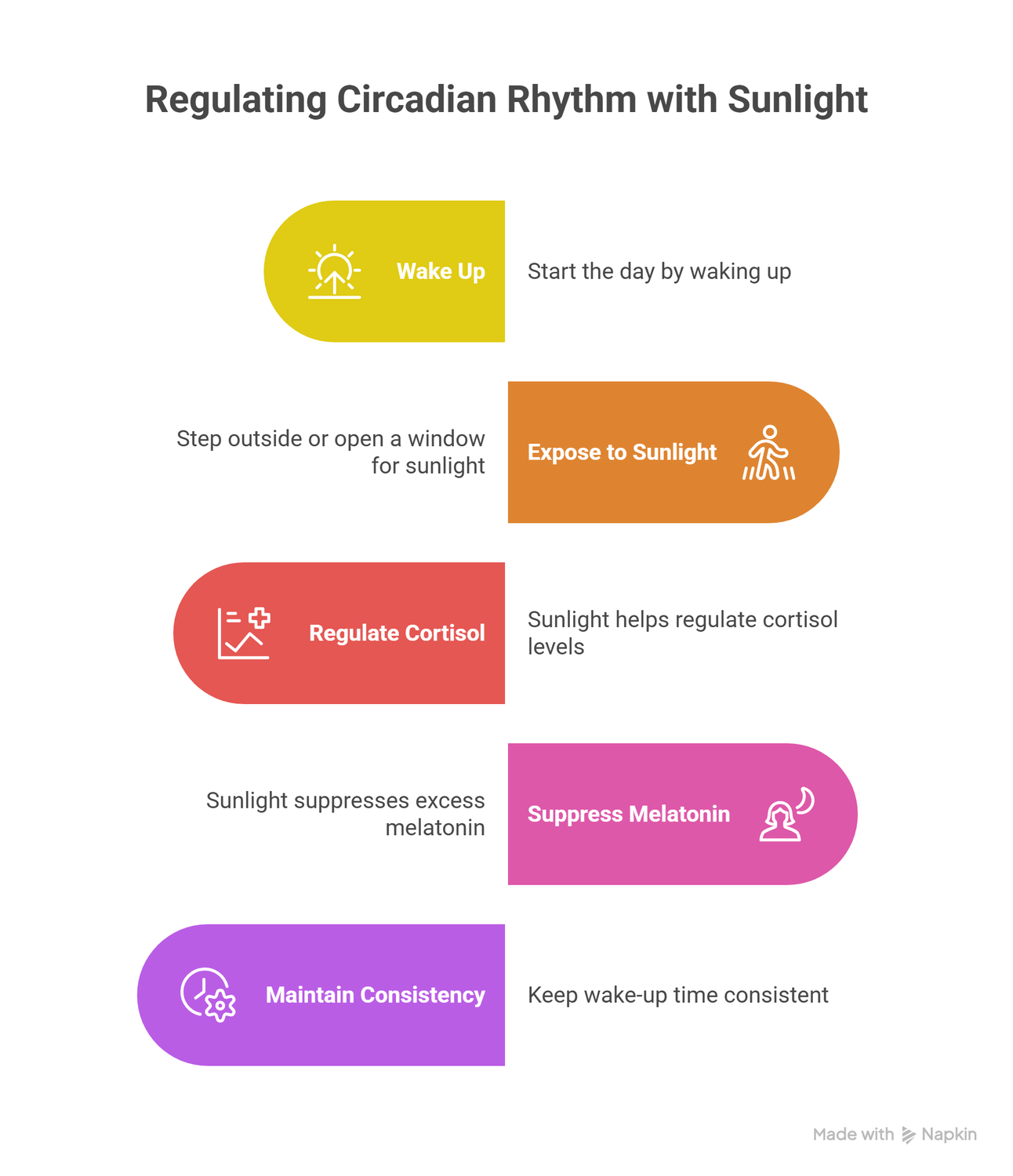
2. Start with Proper Hydration
After 7–8 hours of sleep, your body is mildly dehydrated.
Even slight dehydration can reduce mental focus, slow digestion, and cause fatigue.
Hydration helps jump-start metabolism, supports circulation, and flushes toxins accumulated overnight.
Morning routine idea:
Drink a glass of warm water with lemon immediately after waking.
Add a pinch of sea salt or electrolyte powder if you tend to feel dizzy or have low blood pressure.
Limit coffee until 30 minutes after hydration, as caffeine acts as a mild diuretic.
Medical note:
A study in the European Journal of Nutrition found that proper morning hydration improves cognitive performance and mood, especially in women.

3. Eat a Balanced, Protein-Rich Breakfast
Skipping breakfast or choosing a sugary meal can spike and crash your blood sugar — leaving you tired mid-morning.
A balanced breakfast stabilizes glucose levels and fuels both body and brain.
Aim for:
Protein: eggs, Greek yogurt, cottage cheese, tofu, or nuts
Complex carbs: oats, whole-grain toast, or quinoa
Healthy fats: avocado, chia seeds, olive oil
✅ Example Breakfast:
Scrambled eggs with spinach + a slice of whole-grain toast + green tea.
Why it works:
Protein triggers the release of dopamine, which boosts alertness, while complex carbs provide steady energy release for 3–4 hours.

4. Move Your Body — Even for 10 Minutes
Morning movement increases blood flow, oxygen supply, and endorphin release — your body’s natural “feel-good” chemicals.
It doesn’t have to be a long workout; consistency matters more than duration.
Try:
5 minutes of stretching or yoga
10 minutes of brisk walking or stair climbing
Light resistance or body-weight exercises
Medical fact:
A study in Psychophysiology Journal found that even 10 minutes of moderate morning exercise increases oxygen uptake and improves cognitive performance throughout the day.
5. Manage Stress Before It Manages You
Waking up to notifications and stress immediately raises cortisol and adrenaline, draining your energy early.
A calm start sets the emotional tone for your entire day.
Morning stress-management habits:
5 minutes of deep breathing (inhale 4 seconds, exhale 6 seconds)
Gratitude journaling (write 3 things you’re thankful for)
Gentle stretching while listening to calming music
Science says:
Mindfulness practices in the morning reduce daytime anxiety and enhance focus by regulating the hypothalamic-pituitary-adrenal (HPA) axis — the body’s stress control center.
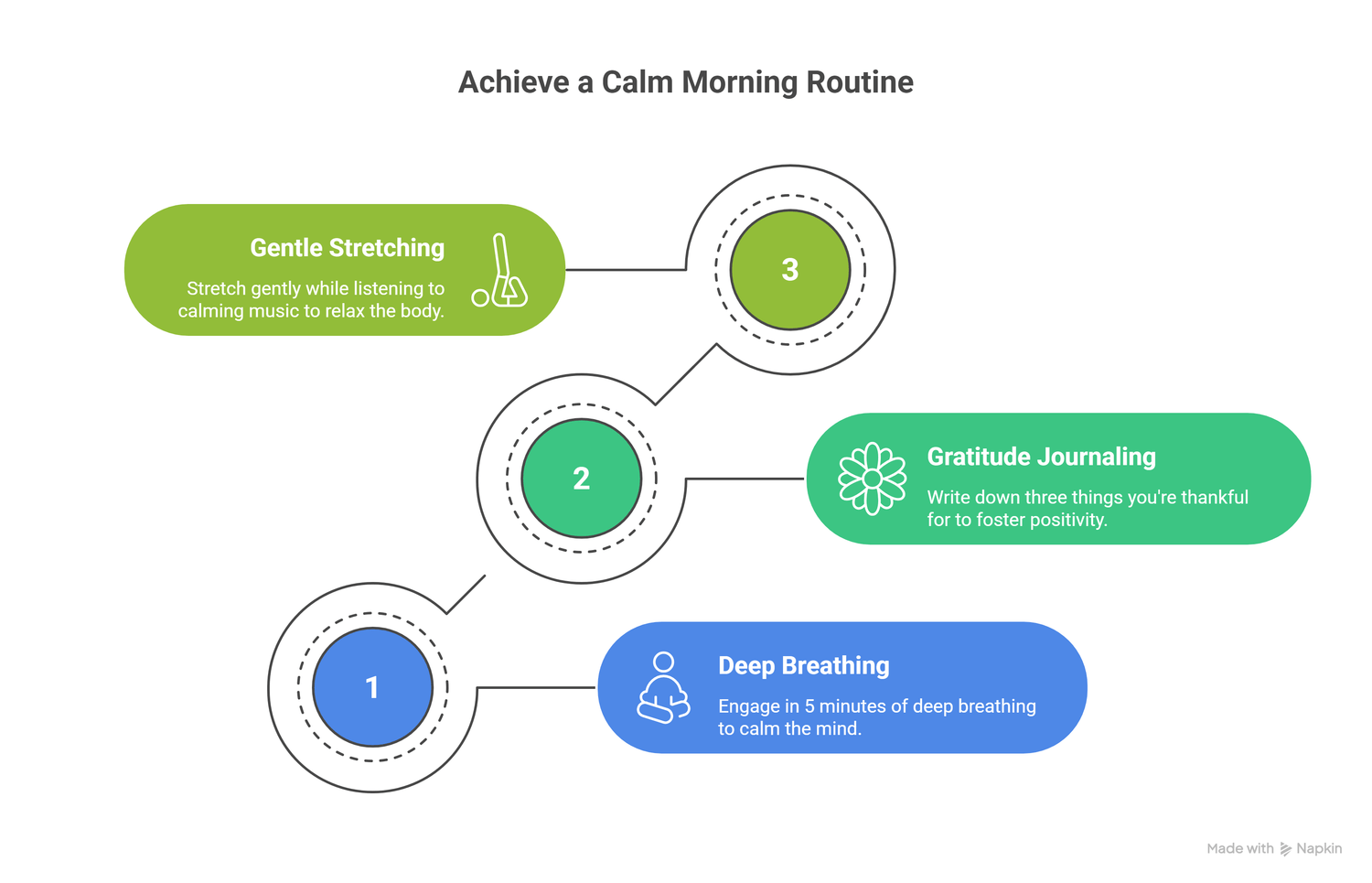
6. Get Moving Before Reaching for Coffee
Caffeine boosts alertness, but when consumed too early — right after waking — it can interfere with your natural cortisol rhythm.
Instead, wait 60–90 minutes after waking before your first coffee.
This allows cortisol to peak naturally, ensuring caffeine enhances rather than replaces your natural energy.
Better energy alternative:
Try green tea — it provides caffeine along with L-theanine, an amino acid that promotes calm focus without the jitters.
7. Avoid Digital Overload First Thing
Checking your phone or social media immediately floods your brain with information, triggering dopamine spikes and mental fatigue before your day even begins.
Energy-saving habit:
Create a “digital-free first hour” rule. Use that time for self-care, breakfast, or journaling before checking messages.
Medical note:
Studies in Frontiers in Psychology show that limiting early-morning screen exposure reduces stress hormone surges and improves mental focus.
8. Support Energy with Micronutrients
Deficiencies in key vitamins and minerals can cause chronic low energy even with healthy habits.
Key nutrients for sustained vitality:
Iron: essential for oxygen transport (found in red meat, lentils, spinach).
Vitamin B12 & B6: help convert food into energy (found in eggs, fish, fortified cereals).
Magnesium: supports muscle relaxation and energy metabolism (found in almonds, avocado, dark chocolate).
Vitamin D: low levels are linked to fatigue and low mood — get morning sun or supplements if deficient.
Tip: Always check blood levels and consult your doctor before supplementation.
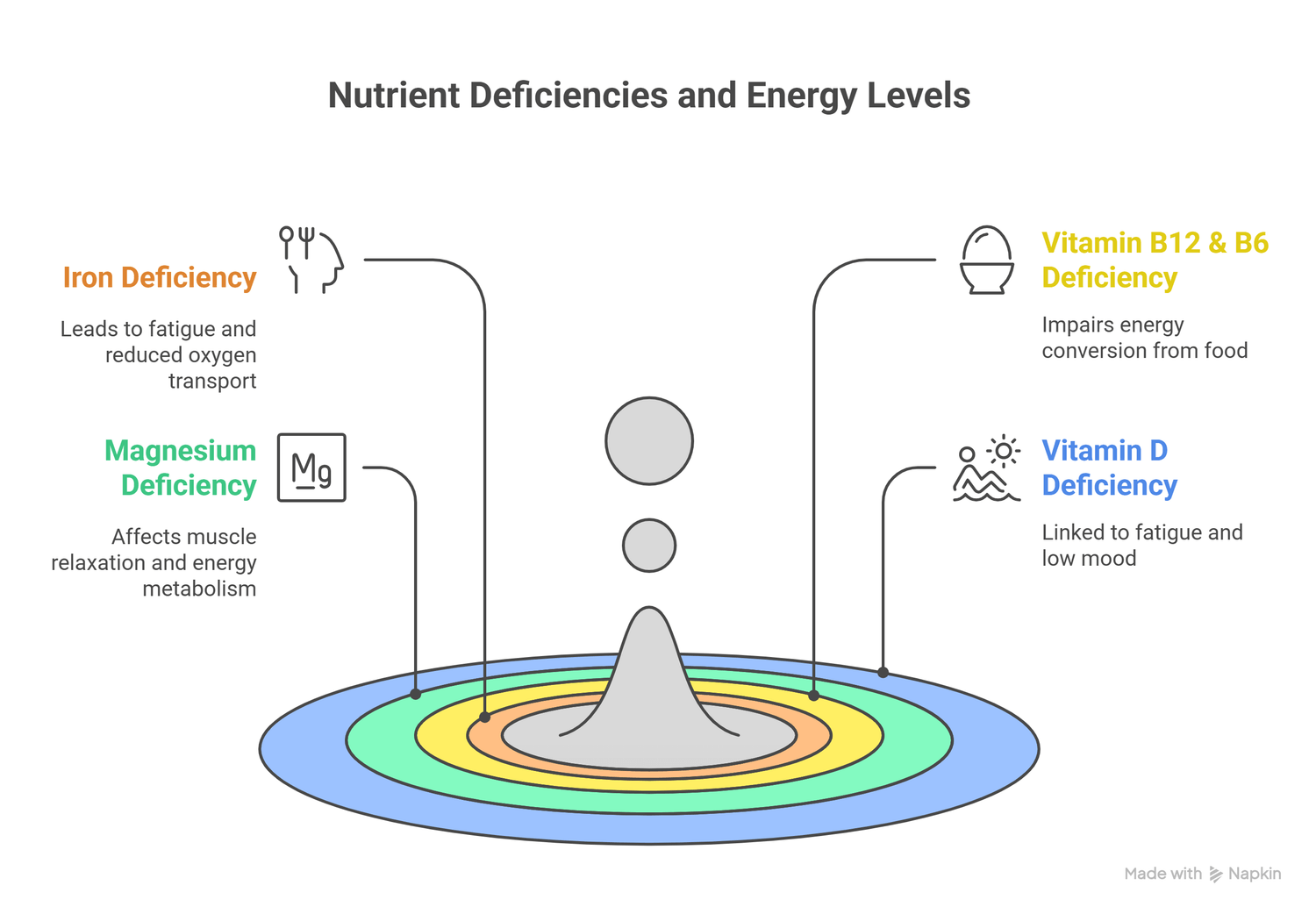
9. Prioritize Quality Sleep the Night Before
Good mornings begin the night before.
Poor sleep impairs glucose metabolism, hormone balance, and mood regulation.
To ensure restful sleep:
Keep your room dark, cool, and quiet.
Avoid heavy meals or caffeine after 6 p.m.
Disconnect from screens 1 hour before bed.
Science-backed fact:
Consistent, adequate sleep (7–8 hours) enhances mitochondrial energy production — your cells’ power source.
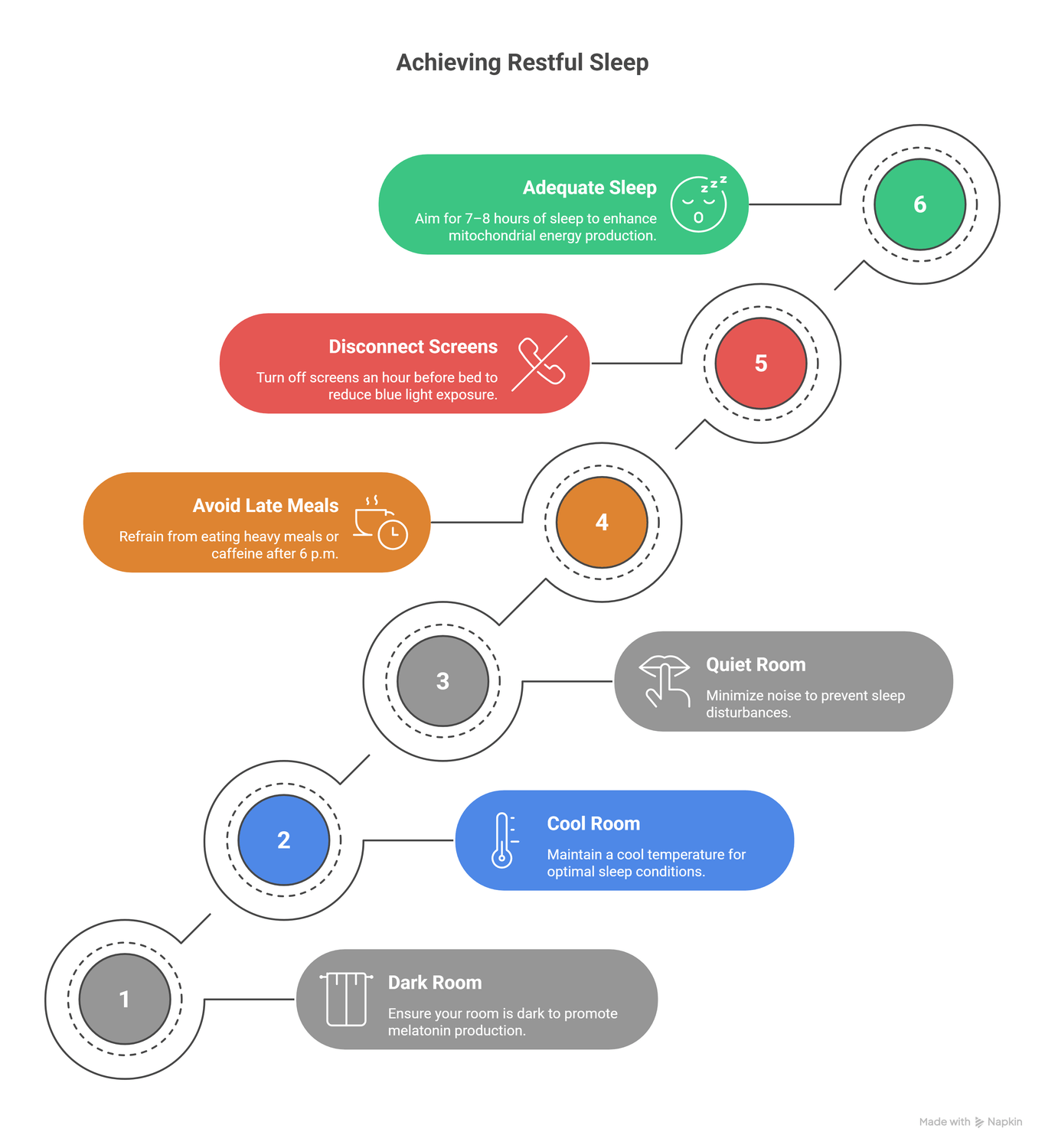
10. Create a Consistent Morning Routine
Your body thrives on rhythm.
When you wake, eat, move, and sleep at the same times daily, you train your internal clock to release hormones and energy more efficiently.
Sample energizing routine:
Wake up and hydrate.
Get sunlight exposure for 5–10 minutes.
Light movement or stretching.
Protein-rich breakfast.
Mindfulness or journaling.
Coffee or tea after 1 hour.
Following this consistently strengthens your metabolism, mental focus, and daily productivity.
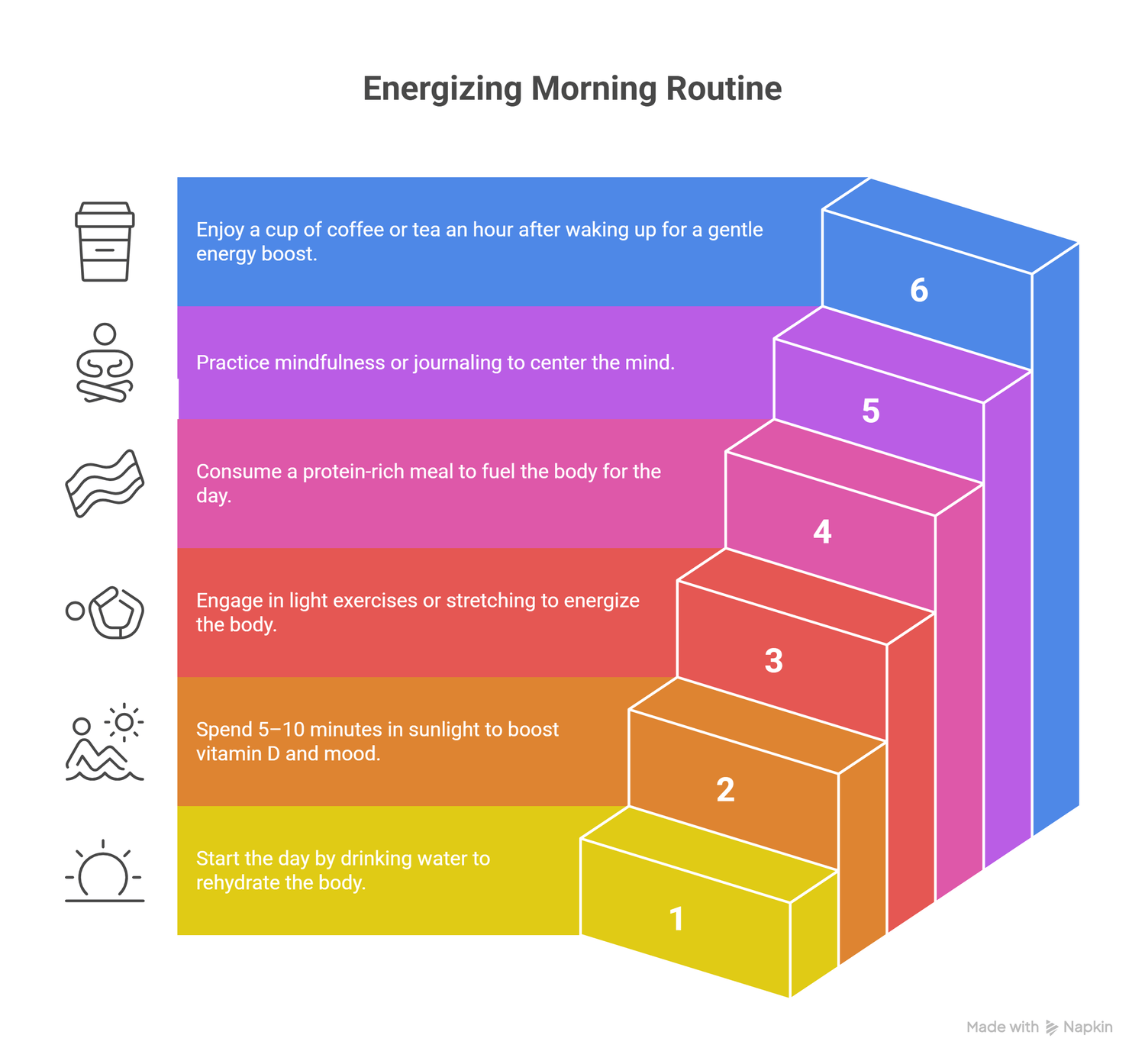
Conclusion: Mornings Are Your Foundation for Health
Better energy doesn’t come from quick fixes — it’s built through small, consistent habits that respect your body’s natural rhythms.
Start your day with sunlight, hydration, movement, and calm focus, and you’ll notice clearer thinking, balanced mood, and genuine vitality.
Remember: energy is created, not found — and it starts every morning with you.
